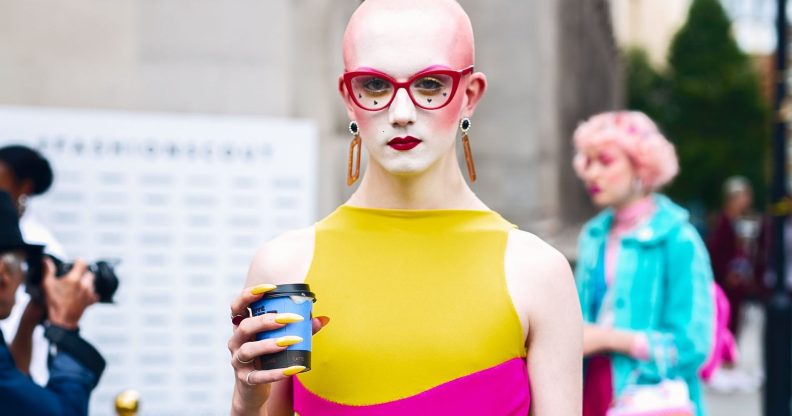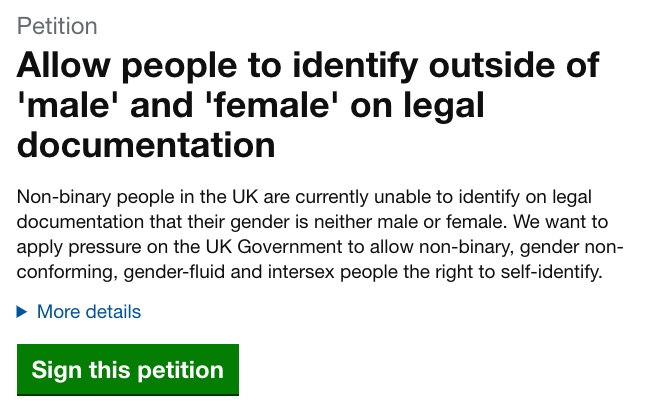Petition demands non-binary gender option on legal documents

Model and activist Jamie Windust started the petition to demand a non-binary option on legal documents in February 2019. (Supplied)
For most people, renewing a passport is a somewhat costly, annoying bureaucratic matter that needs doing once every decade or so.
But for those who identify outside the male/female binary, having to declare their gender by picking between just those two options adds a layer of complexity to the process.
Recently confronted with such predicament, non-binary model and activist Jamie Windust chose to go down the political path.
In February, Windust set up an official petition asking the government to add a non-binary option for gender identity on legal documents. Three weeks since it went live, the petition has already accrued more than 8,000 signatures.
If at least 10,000 sign the petition over the next six months, the government will have to issue an official response. If the 100,000 signature mark is reached by August 12, the petition will be debated in parliament.

More than 8,000 people have signed the petition in the past three weeks.
Windust tells PinkNews they set up the petition in the hope that it will pressure the government to consider the issue of a non-binary option on legal documents.
“We’re just over 2,000 signatures away from getting a response, which is the first step,” they said. “I’ve got about about five or six months until mid-August, so that’s quite promising.”
Windust is not the first person to try the petition approach—but may very well be the first to succeed.
Last year, a petition demanding the UK legally recognise non-binary gender identities only accrued 6,886 signatures by the time it closed in July.
“I don’t want to be stuck with a passport for the next five-10 years that does not have the correct identification on it.”
— Jamie Windust
Also last year, non-gendered campaigner Christie Elan-Cane fought in the High Court for the recognition of a non-binary option on legal documents. Specifically, Elan-Cane argued that passports should have a third gender option, ‘X,’ and denounced the current situation as “inherently discriminatory.”
Elan-Cane lost the battle, as High Court judge Mr Justice Jeremy Baker refused to rule the government policy as unlawful.
Having studied the case, Windust is optimistic that there are no legal barrier to the inclusion of a non-binary gender option, it’s simply a matter of political will.
“They just think it’s going to cost too much money which is a bit barbaric,” Windust says.
The campaigner adds that the UK border controls already recognise passports from other countries—such as Australia, Canada, Denmark, Germany, India, Malta, New Zealand, Pakistan and, recently, the Netherlands—that do allow people to identify as non-binary on their passport.
“It made me realise that there is a space where we can do it, it’s just that we haven’t,” Windust adds.
How would the non-binary gender option look like?
The campaigner would ideally like to see the option to self-identify on documents, but they’d also be happy to settle for a third, non-binary option.
Windust points existing models the UK could follow such as the policy recently implemented in New York City, or the one under consideration in Iceland.
In the Scandinavian country, the chairperson of Intersex Iceland, Kitty Anderson, and writer and trans activist Ugla Stefanía Kristjönudóttir Jónsdóttir wrote the draft of a bill that would introduce a ‘X’ gender option on legal documents, among other changes that would de-medicalise the process of changing the gender marker.
Windust believes that similar changes in the UK would make non-binary, transgender and intersex people feel recognised by [government] institutions and, on a more pragmatical level, feel safer when traveling.
“For me it would make it easier and have peace of mind when I’m traveling … it’s something I find quite anxiety-inducing,” Windust says. “It would make non-binary people like myself feel visible and listened to. The institutions were made in a binary sense. To actually being able to identify is a big thing in that respect.”
Why should people sign the petition demanding a non-binary option?
Windust hopes that the plight of non-binary, intersex and trans people will resonate with the larger LGBT+ community, allies and the wider population. Supporting the petition, they say, is about empathy.
“It’s about putting yourself in somebody else’s shoes and try imagining what it would be like to have the institutions [in the country] we live in not recognise you as a person,” Windust says. “It’s about allyship and pushing government to change in a simple way, by sharing or signing a petition, or doing both. It’s very easy and it also has the opportunity to have a huge impact on people’s lives.”
As for themselves, Windust won’t be renewing their passport until they can identify as their correct gender.
“I have put that off because I [don’t] feel comfortable at the moment,” they say. “I know it’s a bold statement, but I think that’s important and I am aware how long a passport lasts and I don’t want to be stuck with a passport for the next five to 10 years that does not have the correct identification on it.”
Jamie Windust’s petition can be signed here.

